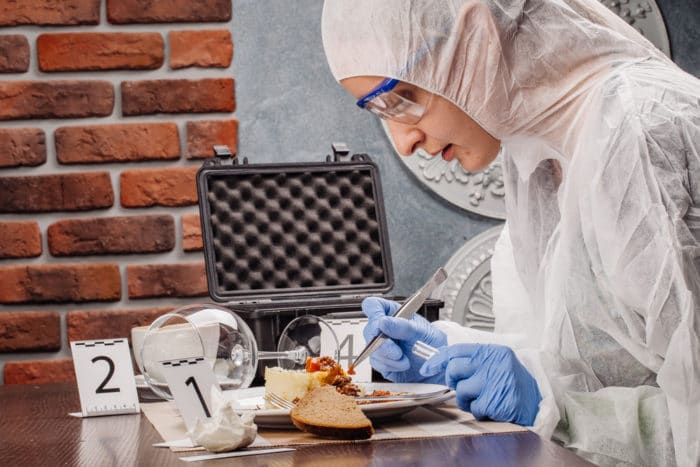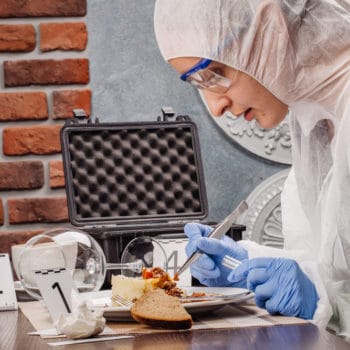Why We Love It
-
$79,620Potential Avg. Salary*
* Salary & growth data is based on the recent Bureau of Labor and Statistics data published at https://www.bls.gov/oes/current/oes333021.htm for 33-3021 Detectives and criminal investigators 11/2021. Based on national data, not school-specific information. Conditions in your area may vary.
With a bachelor of science in forensic science, you’ll be prepared to assist scientists in the collection and analysis of crime data and evidence.
Forensic science spans a variety of disciplines, and students can choose to focus on several areas: computer forensics, DNA analysis, handwriting analysis, and sample analysis, among many others. You can also continue your education to become a research scientist.
What is a Degree in Forensic Science?
With a bachelor of science in forensic science, you’ll be prepared to either enter the exciting field of forensic science or continue your education to become a specialist in the field.
Forensic science covers a variety of scientific and research disciplines, and the skills of forensic scientists are being increasingly used in courtrooms across the US to help solve crimes. In this degree program, you’ll learn how to apply the disciplines of the field to create a specialty career that’s focused on the science of crime solving.
A bachelor’s degree in forensic science is a foundational degree that opens students to a variety of careers. They may work as crime scene investigators, collecting evidence to be analyzed in a lab. They may assist professional forensic scientists with tasks related to the collection and analysis of evidence.
They may also continue their educations to earn graduate degrees and become full forensic scientists in their preferred discipline. Students can usually either choose a specialization or study forensics overall.
Recommended Schools
What Courses Would I Take For a Major in Forensic Science?
- Crime Scene Processing
- Physical Evidence
- Body Fluid and DNA Analysis
- Toxicology
- Forensic Molecular Biology
- Instrumental Analysis
- Criminal Justice
- Expert Witness Testimony
What Jobs Can You Get with a Degree in Forensic Science?
As forensic science has become more sophisticated, it is increasingly being relied on by prosecutors and defense attorneys in courtrooms across the US. In many cases, the analysis and testimony of forensic scientists directly impact the outcome of criminal trials.
For this reason, it’s expected that demand for qualified and talented forensic scientists will continue to grow in order to analyze and interpret evidence, telling the story of a crime and its perpetrator from a scientific perspective.
How Long does it take?
A bachelors in Forensic Science will have a typical length of 4 years in a full time schedule. That said, there are many ways to speed up the timeframe by either taking more units via online coursework, community college, or taking free classes at OnlineDegree.com that could transfer to universities in the US.
Online Forensic Science Degree
Online forensics degree programs are available from a number of universities but the experience is not equivalent to conventional learning. Students will still miss the practical experience which is critical for the majority of fields in forensics.
This can be compensated by studying separate practicum courses and internships. The requirements for completing an online bachelor degree are variable with some programs including 36 credit hours only while others may include up to 126 credit hours.
What Can You Do With a Forensic Science Degree?
Forensic science refers to the use of scientific tools for criminal investigations which is also known as criminalistics. The role of forensic scientists is to collect, preserve and analyze evidence from crime scenes. Some forensic scientists are field agents traveling to the crime site while others work in the lab on evidence collected or bodies of victims.
They should be able to determine the identity of people present in a crime scene, the cause of an injury or death, time of a crime as well as identify misleading or manipulated evidence. Forensic scientists must also have legal knowledge in order to follow the standards of admissible evidence and criminal procedure.
Forensic science is an exciting and challenging career. Solving the crimes requires attention to all details and making connections between the evidence and the crime committed. Forensic scientists will have to develop their own protocols and conclusions as the probabilities that can happen in the crime world are virtually unlimited.
What does a forensic science student learn?
Forensic students study the main investigation tools that are commonly used in addition to the legal considerations for the evidence. The following list shows courses commonly offered in a forensic science degree program:
- Basic science courses: the majority of evidence in a crime scene is analyzed using chemical tools accordingly general and organic chemistry are common courses in forensic science programs.
- Introduction to Forensic Science: this course provides an introduction to the main concepts in forensics including the identification of evidence and the proper way for storage and transfer. The course also involves lab investigations and solving model crimes.
- Crime scene processing: this course introduces the standard protocols used to collect evidence from a crime scene ensuring that no external changes are done to the crime scene like moving an object or body.
- Forensic pathology: in this course, students get trained on determining the cause of an injury or death based on the structure and shape of body tissues and organs.
- Forensic trace evidence: some crimes may be solved using a tiny piece of evidence like a single hair or traces of materials. Accordingly, forensic scientists are required to keep an eye on such little things and learn how to deal efficiently with these small amounts. Failure to handle and damage such evidence may result in serious legal consequences.
- Forensic toxicology: students learn about the different types of toxins that are used in crimes including the source of these toxins, their effects and methods for identification.
- Physical evidence: this course focuses on dealing with non-biological evidence such as tire marks, footprints, fingerprints, fibers, paints or building materials.
- DNA analysis: this is among the most important evidence commonly used in forensics. A small sample from a single hair, body fluids or a few cells is usually enough to identify the presence of a person in a crime scene.
- Forensic lab internship: solving a crime scene depends heavily on practical experience accordingly all forensics students are expected to complete an internship in forensic lab before graduation.
Now I have a forensic science degree…where can I work after graduating?
Gaining a degree in forensic science is difficult and challenging to complete as students are required to be highly qualified in a variety of disciplines. Career options in forensics are very exciting as you are always solving new puzzles and challenging criminals who are doing whatever they can to hide their identity. The following are examples of the various jobs available in forensics:
- Forensic medical examiner: this is the highest-paid career in forensics with salaries reaching more than $200,000 yearly. The role of the examiner is to identify the cause of death but board certification is needed which limits the number of schools available for this position.
- Forensic engineer: forensic engineers examine the cause of failure of machines or structures and detect intentional manipulation or other criminal actions.
- Forensic accountants: they work to detect illegal transactions or attempts to cover financial issues related to crimes
- Crime scene investigators: they are field agents who are responsible for collecting, storing and transferring evidence from crime scenes
- Crime laboratory analysts: they work on the samples received from crime scene investigators.
- Other forensic jobs: Arson Investigator, computer forensic investigator, crime scene photographer, forensic anthropologist and document examiner.
Should I choose a forensic science degree?
If you are passionate about science and enjoy solving puzzles and mysteries then you should probably think about studying forensic science. Studying forensics will help you develop a set of important skills:
- Organized, creative and independent thinking
- Meticulous attention to small details
- Objectivity and sensitivity to critical and confidential information
- Ability to concentrate and work efficiently under stress
- Ability to relate observation to uncommon theories or phenomena
- Critical thinking and data analysis skills
Recommended Schools
Best Jobs for Forensic Science Degrees
With a bachelor’s degree, graduates of forensic science programs can enter the career field and find work as crime scene investigators or assistants to professional forensic scientists.
Students can also choose to continue their educations to earn masters and doctoral degrees in their field of interest in order to work as professional forensic scientists or professors teaching college forensics courses.
How to save time and money
Our mission is to help you to avoid paying full price for college. We want your Forensic Science degree to be affordable and accessible. Here’s how you could save:
Create Your Free SmartPlan

There are many ways to make college affordable and accessible.
That’s why we created a helpful tool called SmartPlan.
It’s free, and helps you find potential ways to save and tons of information about each school you’re considering
Think of it as your “college blueprint”, to help you instantly craft a path to your degree:
- Which Colleges Match Your Needs
- Ways You Could Save Time & Money
- Free Courses You Could Take for Credit
- Valuable Data and Insights on Each College
- Detailed Steps You Should Take!
See what’s possible for you and generate a free plan within just a few minutes
Create My SmartPlanYou Might also be Interested in
Many visitors who look for a degree in Forensic Science are also interested in the following degrees.







